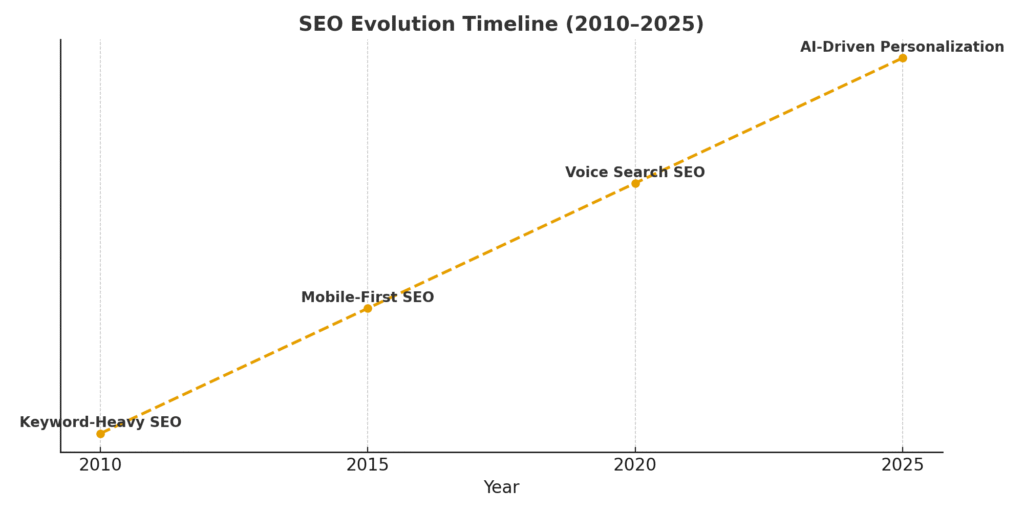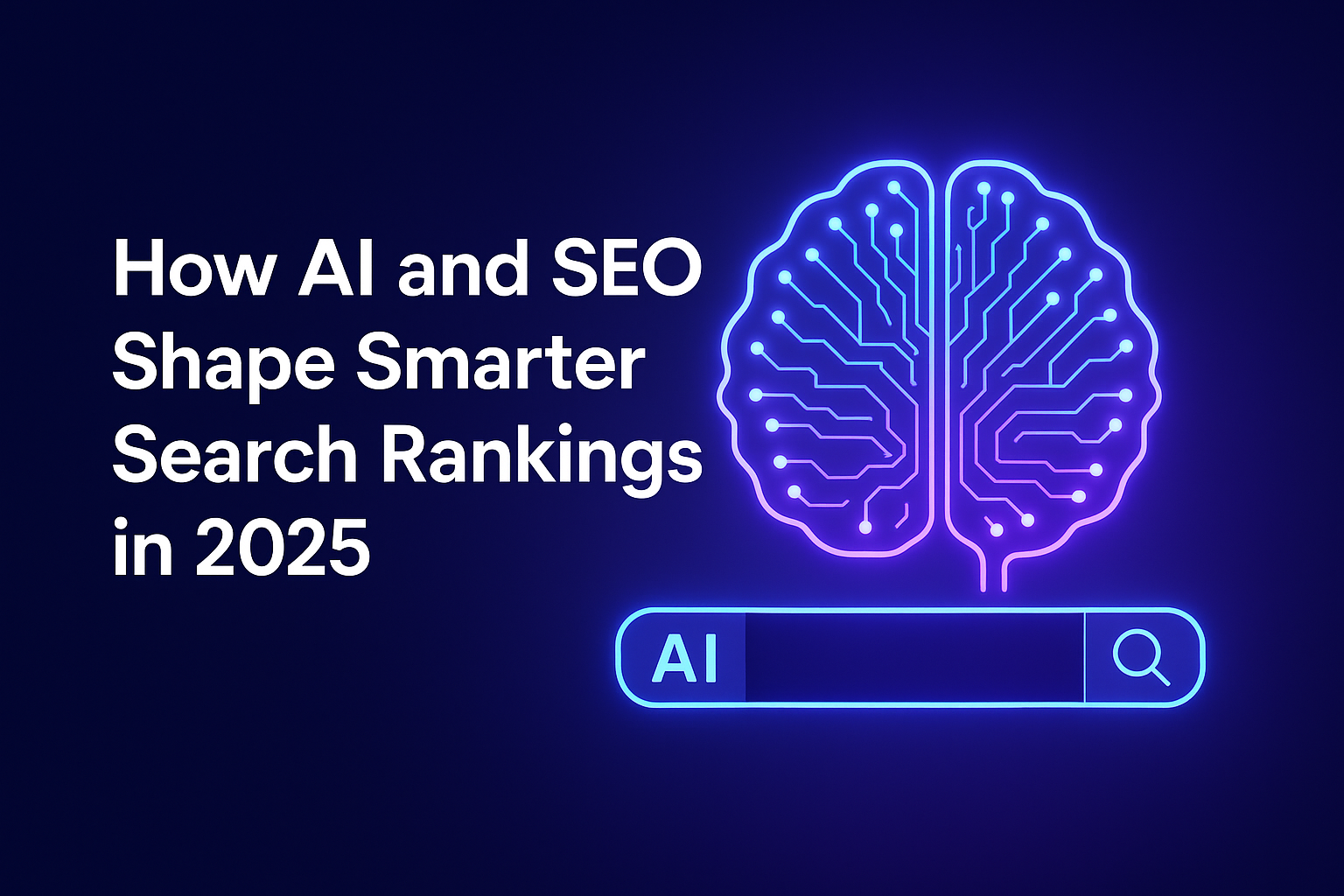How Artificial Intelligence Is Transforming SEO Today
Artificial intelligence is no longer a futuristic concept, it’s the foundation of modern search optimization. In 2025, search engines rely heavily on AI-powered algorithms that read, analyze, and evaluate content more like humans than machines. This means strategies that once worked, such as keyword stuffing or backlink overuse, have lost their effectiveness.
Instead, AI now interprets user intent, evaluates content quality, and measures engagement signals like dwell time and voice queries. For businesses, the shift is not about gaming the algorithm but aligning with it. Companies like DWebSol emphasize AI-driven SEO because it creates sustainable visibility and authentic connections with audiences.
What Search Rankings Look Like in 2025
Search results no longer operate in a static “10 blue links” model. Instead, results are dynamic, personalized, and enriched by AI-driven features. A single query can produce:
- Conversational snippets powered by natural language processing
- AI-generated summaries that synthesize top sources
- Multimedia responses including videos, podcasts, and interactive charts
- Location-aware results tailored to hyperlocal intent
For SEO professionals, this evolution demands a shift toward creating experience-rich content. Structured data, multimedia, and conversational tone matter more than ever because AI tools prioritize clarity and user satisfaction.

Why AI Matters More Than Ever in SEO
The core purpose of AI in search is to provide users with the most relevant, accurate, and helpful answers instantly. Here’s why AI-driven SEO is crucial:
- Smarter Query Understanding – Search engines can interpret complex, conversational queries.
- Content Quality Assessment – Algorithms evaluate expertise, authority, and trustworthiness rather than word counts.
- Personalized Search Experiences – AI tailors results to user history, context, and preferences.
- Faster Adaptation – Businesses that embrace AI strategies maintain visibility even as search systems evolve.
For companies, the cost of ignoring these changes is significant: decreased visibility, lower traffic, and missed opportunities in competitive industries.
When AI Became the SEO Game-Changer
The tipping point arrived in 2023–2024, when search engines integrated conversational AI into mainstream search. By 2025, AI dominance is no longer a trend but the standard. Voice searches, AI chat assistants, and predictive engines now power everyday queries.
The transition wasn’t sudden, it evolved through years of machine learning and NLP advancements. Businesses that adapted early now enjoy compounding advantages. Those catching up must work faster and smarter to remain visible.
SEO Before AI vs. SEO After AI
| Factor | Before AI (2010–2020) | After AI (2025) |
| Ranking Basis | Keywords + Backlinks | Intent + Context |
| Content Focus | Quantity | Quality & Expertise |
| User Interaction | Static Results | Personalized & Conversational |
| Algorithm Adaptation | Slow | Real-Time Learning |
Where AI Impacts SEO Most
AI influences nearly every stage of SEO, but its biggest impact is visible in:
- Content Creation – AI tools guide writers to produce content aligned with search intent and topical authority.
- Technical SEO – Crawlers enhanced by AI can detect indexing issues, duplicate content, and schema gaps instantly.
- User Experience (UX) – Sites optimized for AI-driven ranking signals load faster, are more accessible, and deliver value.
- Local SEO – Hyperlocal targeting ensures businesses appear in the right neighborhood or city searches.
For example, at DWebSol, SEO experts combine AI insights with traditional optimization to ensure clients dominate both general and hyperlocal searches.
How Businesses Can Harness AI for SEO in 2025
To succeed in an AI-driven environment, businesses need a clear roadmap. Some actionable strategies include:
- Leverage Predictive Analytics – Forecast trending topics and customer needs before they peak.
- Focus on E-E-A-T – Expertise, experience, authority, and trustworthiness matter more than keywords alone.
- Integrate Voice & Visual Search – Optimize content for spoken questions and image-based discovery.
- Strengthen Local Presence – Ensure accuracy in business listings, maps, and reviews.
- Adopt AI SEO Tools – Use AI for competitor analysis, keyword clustering, and real-time content optimization.
By applying these strategies, businesses move beyond visibility to true relevance—staying ahead of competitors and gaining long-term trust.
Advantages of AI-Enhanced SEO Over Traditional Approaches
- Real-Time Adaptation – AI learns from billions of queries daily, adjusting instantly.
- Deeper User Understanding – Contextual analysis creates smarter, intent-based matches.
- Better ROI – Content is aligned with what audiences genuinely want, reducing wasted marketing spend.
- Sustainable Growth – Instead of chasing short-term ranking tricks, AI-powered SEO builds enduring authority.
This means companies working with advanced SEO providers like DWebSol gain not just clicks but lasting brand equity.
Conclusion: What the Future Holds for AI and SEO
The future of search is undeniably AI-powered. By 2025, success no longer depends on exploiting loopholes but on embracing intelligence, adaptability, and value creation. Businesses that understand how AI interprets content, and why it prioritizes quality, will thrive.
For organizations ready to lead in digital visibility, DWebSol provides the expertise and strategies to align with AI-driven SEO. The companies that act today secure not just rankings but long-term authority in their industries.
